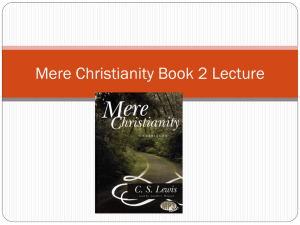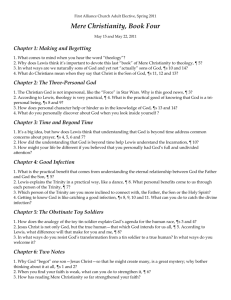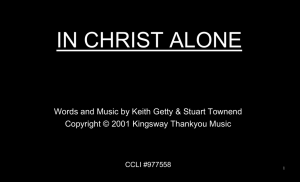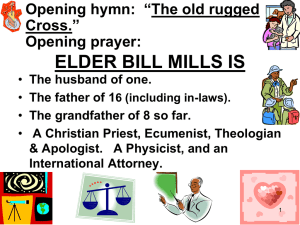MERE CHRISTIANITY
advertisement
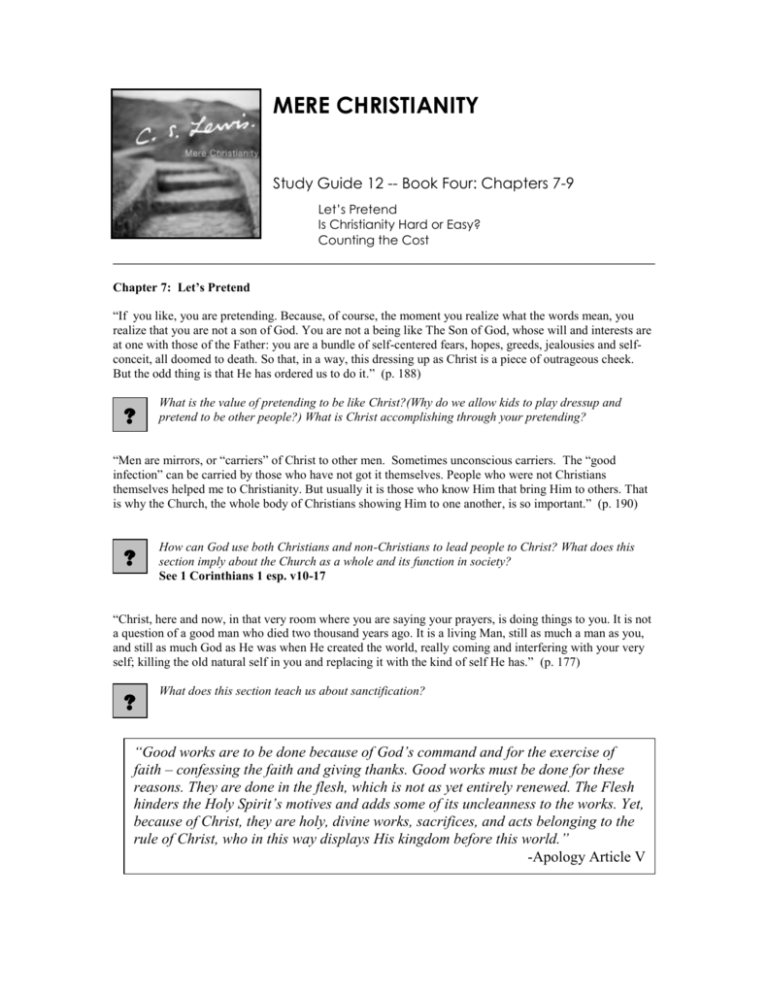
MERE CHRISTIANITY Study Guide 12 -- Book Four: Chapters 7-9 Let’s Pretend Is Christianity Hard or Easy? Counting the Cost ________________________________________________________________________ Chapter 7: Let’s Pretend “If you like, you are pretending. Because, of course, the moment you realize what the words mean, you realize that you are not a son of God. You are not a being like The Son of God, whose will and interests are at one with those of the Father: you are a bundle of self-centered fears, hopes, greeds, jealousies and selfconceit, all doomed to death. So that, in a way, this dressing up as Christ is a piece of outrageous cheek. But the odd thing is that He has ordered us to do it.” (p. 188) ? What is the value of pretending to be like Christ?(Why do we allow kids to play dressup and pretend to be other people?) What is Christ accomplishing through your pretending? “Men are mirrors, or “carriers” of Christ to other men. Sometimes unconscious carriers. The “good infection” can be carried by those who have not got it themselves. People who were not Christians themselves helped me to Christianity. But usually it is those who know Him that bring Him to others. That is why the Church, the whole body of Christians showing Him to one another, is so important.” (p. 190) ? How can God use both Christians and non-Christians to lead people to Christ? What does this section imply about the Church as a whole and its function in society? See 1 Corinthians 1 esp. v10-17 “Christ, here and now, in that very room where you are saying your prayers, is doing things to you. It is not a question of a good man who died two thousand years ago. It is a living Man, still as much a man as you, and still as much God as He was when He created the world, really coming and interfering with your very self; killing the old natural self in you and replacing it with the kind of self He has.” (p. 177) ? What does this section teach us about sanctification? “Good works are to be done because of God’s command and for the exercise of faith – confessing the faith and giving thanks. Good works must be done for these reasons. They are done in the flesh, which is not as yet entirely renewed. The Flesh hinders the Holy Spirit’s motives and adds some of its uncleanness to the works. Yet, because of Christ, they are holy, divine works, sacrifices, and acts belonging to the rule of Christ, who in this way displays His kingdom before this world.” -Apology Article V Chapter 8: Is Christianity Hard or Easy? “The Christian way is different: harder and easier. Christ as “Give me All. I don’t want so much of your time and so much of your money and so much of your work: I want You.” (p. 196) ? How is being moral not the same as being Christian? “When He said, “Be perfect”, he meant it. He meant that we must go in for the full treatment. It is hard; but the sort of compromise we are all hankering after is harder – in fact, it is impossible. It may be hard for an egg to turn into a bird: it would be a jolly sight harder for it to learn to fly while remaining an egg. We are like eggs at present. And you cannot go on indefinitely being just an ordinary, decent egg. We must be hatched or go bad.” (p. 198 – 199) ? What is the difference between “excellence” and “perfection”? Why is it so important to surrender our will and be led according to His will? Chapter 6: Counting the Cost “Now if I may put it that way, Our Lord is like the dentists. If you give Him an inch, He will take an ell. Dozens of people go to Him to be cured of some one particular sin which they are ashamed of…He will cure it all right: but he will not stop there.” (p. 202) ? Imagine if you went to your dentist and asked him/her to only clean one tooth in your whole mouth on that particular visit. How do you think they would respond? What is the danger in thinking that if you “remove” one particular egregioius sin you will be better? “The command Be ye perfect is not idealistic gas. Nor is it a command to do the impossible. He is going to make us into creatures that can obey that command…If we let Him – for we can prevent Him, if we choos – He will make the feeblest and filthiest of us into a god or goddess, a dazzling, radiant, immortal creature, pulsating all through with such energy and joy and wisdom and love as we cannot now imagine, a bright stainless mirror which reflects back to God perfectly (though, of course, on a smaller scale) His own boundless power and delight and goodness. The process will be long and in parts very painful, but that is what we are in for.” (p. 205-206)






